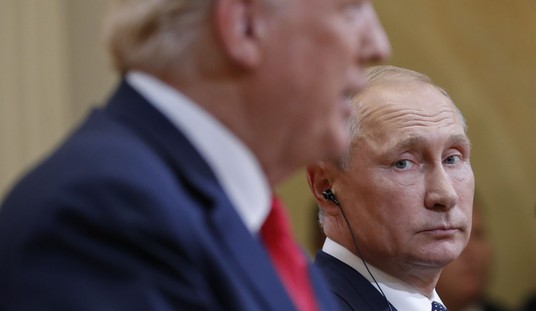At Hot Air over the weekend, Libby Sternberg had a suggestion for Mitt Romney. Writing that “I view the 2012 contest is the 1932 match-up between challenger FDR and incumbent Herbert Hoover. Republicans could learn some things by studying it:”
[N]ow that the dust has settled and Mitt Romney is on a glide path to nomination victory, the FDR/Hoover parallels resurfaced for me. And I believe Romney is in the ideal spot to play the FDR role, albeit in a Semi-Bizarro World universe where some, but not all, things are opposite.
Mitt could, for example, embrace this snippet from FDR’s nomination speech of 1932:
“I know something of taxes. For three long years I have been going up and down this country preaching that Government–Federal and State and local–costs too much. I shall not stop that preaching. As an immediate program of action we must abolish useless offices. We must eliminate unnecessary functions of Government–functions, in fact, that are not definitely essential to the continuance of Government. We must merge, we must consolidate subdivisions of Government, and, like the private citizen, give up luxuries which we can no longer afford.
“By our example at Washington itself, we shall have the opportunity of pointing the way of economy to local government, for let us remember well that out of every tax dollar in the average State in this Nation, 40 cents enter the treasury in Washington, D. C., 10 or 12 cents only go to the State capitals, and 48 cents are consumed by the costs of local government in counties and cities and towns.”
To be clear, this bit of FDR’s speech was preceded by some anti-corporate greed ranting that President Obama’s speechwriters channel relentlessly in the current campaign. But these “small government,” “lower taxes” words were coming from the mouth of a man considered today to be a demi-God in the Democratic pantheon. Make them your own, Mitt, and tell folks who said them first!
That approach certainly worked for the Gipper in 1980, as Steve Hayward wrote in the first volume of The Age of Reagan. Hayward first noted that Ben Hooks of the NAACP spoke at the 1980 GOP convention, along with Reagan reaching out to the AFL-CIO, via his stint as the former head of the Screen Actors Guild, suggesting to them, “Elect a former union president, President,” both obvious efforts to make inroads with Democrats. Hayward added, “Reagan’s greatest act of political larceny, however, occurred in his convention speech, where he concluded:”
The time is now to redeem promises once made to the American people by another candidate, in another time and another place. He said, “… For three long years I have been going up and down this country preaching that government—federal, state, and local—costs too much. I shall not stop that preaching. As an immediate program of action, we must abolish useless offices. We must eliminate unnecessary functions of government. … I propose to you, my friends, and through you that government of all kinds, big and little, be made solvent and that the example be set by the President of the United States and his cabinet.”
So said Franklin Delano Roosevelt in is acceptance speech to the Democratic National Convention in July 1932.
It was a neat trick, at once associating himself with the greatest Democratic hero of the twentieth century, and using that hero’s words against the desuetude of the contemporary Democratic Party. This drove liberals out of their minds. Arkansas Gov. Bill Clinton complained: “Everyone can quote him, but his words out of context mean nothing.”
Forgetting the ancient axiom of Aeschylus—“Those whom the gods would destroy they first make mad”—liberals reached into the back of their file drawers and dusted off the Goldwater playbook from 1964. Columnist Richard Reeves wrote that the Republican convention gave off “a whiff of moral fascism,” while Henry Fairlie wrote in the Washington Post that “The Reaganites on the floor were exactly those who in Germany gave the Nazis their main strength and who in France collaborated with them and sustained Vichy.” Fairlie was just warming up; adding that Reagan’s constituency was “narrow minded, book banning, truth censoring, mean spirited; ungenerous, envious, intolerant, afraid; chicken, bullying; trivially moral, falsely patriotic, family cheapening, flag cheapening, God cheapening; the common man, shallow, small, sanctimonious.” One imagines that Fairlie’s thesaurus could have outlasted the Post’s printing press. House Speaker Tip O’Neill warned that “John Birchers control the Republican Party.” (Ironically, the only member of the John Birch Society then serving in Congress was a Democrat: Georgia Rep. Larry McDonald.) The New Republic gasped: “American reaction—racial, and social and economic—has invested its energies, its hopes, and its ample dollars in Reagan’s candidacy.” This was a mere preview of what would come in the fall campaign.
Which we’re already seeing echoes of today, and it’s only April. Having previously claimed that they were delighted to be running against the namesake creator of RomneyCare, Obama’s staffers are repeating 1980, and once again comparing the latest Republican nominee to Barry Goldwater (doubly ironic, since some on the left, including Hillary Clinton and James Carville seemed to have warmed to Goldwater in the naughts). So why not quote candidate FDR back to the left in response? As Sternberg wrote at Hot Air, “FDR said some things in his previous election battle that Republicans would nod their heads to today.” Back in 2008, Jesse Walker of the libertarian house organ Reason wrote that the 1932 Democratic platform “sounds more like Ron Paul than Pelosi.”
Unfortunately, with the exception of overturning prohibition, as we now now, FDR didn’t govern on many of those ideas, but as Reagan said in 1980, “The time is now to redeem promises once made to the American people by another candidate, in another time and another place.”










Join the conversation as a VIP Member